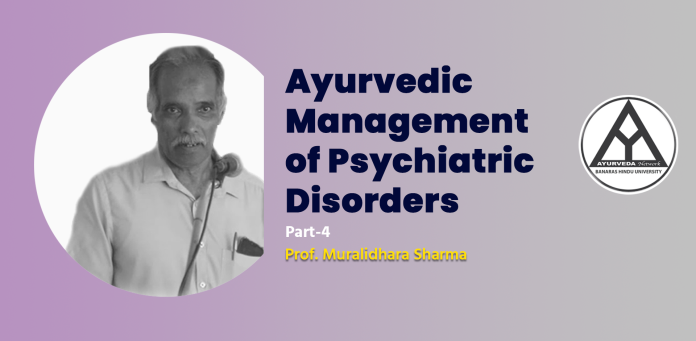Ayurvedic Management of Psychiatric Disorders
Part-4
Prof. Muralidhara Sharma
Transcript by
Dr. Swati Sharma
Senior resident, Dept of Kriya Sharir, IMS BHU
and Dr. Varsha More
based on the lecture available at-Ayurvedic Management of Psychiatric Disorders
Other group of patient lies under Depression, just the other way than anxiety. Depression is co-related with Vishaada. Vishaada is a Vata nanatmaj vyadhi. In Vata nanatmaj vyadhi Vishaada is one of the listed condition according to Ayurveda. Depression is often presented with depressed mood. It could be present be children as well as adolescents. In children it could be presented as irritability. Whereas in adults it could be depressed mood as such. It could also be presented as diminished interest in any of the pleasure activities or in any other activities or almost in any activities. Weight change, appetite disturbance also can be presented as depression. In children it could be presented as abnormal weight gain. Or failure to gain weight could be also a presentation of depression. It can be presented as sleep disturbances (Insomnia or hypersomnia) i.e. the both increased sleep or decreased sleep could be presentation of depression. Psychomotor agitation where person would be having tremors or uncontrolled body movements also can be the presentation of depression. Fatigue or a feeling of fatigue, most common clinically. Feeling of worthlessness, diminished ability to concentrate or indecisiveness. This also can be the presentation of depression. Recurrent thoughts of death or recurrent suicidal ideation could be the presentation of the depression. In general, my approach to the treatment is Vataja nanatmaja vyaadhi chikitsa. So, medicine like Ashwagandharishta and Chandraprabha vati and procedures like Shirodhara and Basti I would like to prescribe in depression considering it a Vataja nanatmaja vyaadhi. So, in many of the clinical cases depression and anxiety could be present alongside. So instead going for each disease and treatment I would rather prescribe medicine for Vataja nanatmaja vyaadhi as said above, depending upon the other presentation of the patients.
Now antidepressants in this case would have adverse effects and area where we can have some ayurvedic approach to the management. The most commonly prescribed anti- depressants like sertraline, fluoxetine, citalopram etc. The most common adverse effects are nausea, increased appetite and weight gain, loss of sexual desire and other sexual problems such as erectile dysfunction and decreased orgasm, fatigue and drowsiness, insomnia, dry mouth, blurred vision, constipation etc. Clinically it is very difficult for the physician to differentiate that whether the symptoms are due to adverse effect of drugs or rather they are the initial symptoms of depression. But in general, a patient who is on antidepressants for last three months and having these symptoms I would consider them as the adverse effects of anti- depressants and would try to stop them wherever possible. Because in patients who are already became dependent on anti- depressants drug it is difficult to stop them as such. So, the decision has to be case specific. The treatment for these adverse effects would be based on presentation for example, for nausea Kamdugha and Soota shekhar is prescribed for short duration. Features like insomnia and so on I would be dealing with by counselling, the usual one.
Now next group of common conditions that come along with depression are insomnia. Textual definition of insomnia is defined as a repeated difficulty with sleep initiation, maintenance, consolidation or quality that occurs despite adequate time and opportunity for sleep and that results in some form of daytime impairment. So to confirm whether a person is having insomnia or not symptoms of patient have to be assessed on Sleepiness scale. It measures the quality of the sleep by measuring if the person is feeling sleepy during day time or not. Method adopted for this is measuring on Sleepiness scale. It is based upon questionnaire.
On this scale patient will give score on 0 1 2 3 scale. If the score given by a person is greater than 10, its definitely considered as an abnormality related to quality of sleep. And the person is needed an intervention for improving the quality of sleep. This is the general protocol followed in psychiatric practice. Suggestions according to psychiatrics for intervention in sleep quality are non- pharmacological. Five protocol are given for the non- pharmacological intervention for improving sleep
Key point
Go to bed only when feel sleepy and avoid day time sleep. Do exercise, so that exertion can lead to sleep. Avoid sleep inducing drugs.
Practically it is difficult to withdraw sedative drugs once the person became dependent on it. Once after withdrawal of drug initially person would have difficulty in maintaining a sleep. And this condition can not be managed with other medicine. Therefore it is better to avoid sedative drugs.


